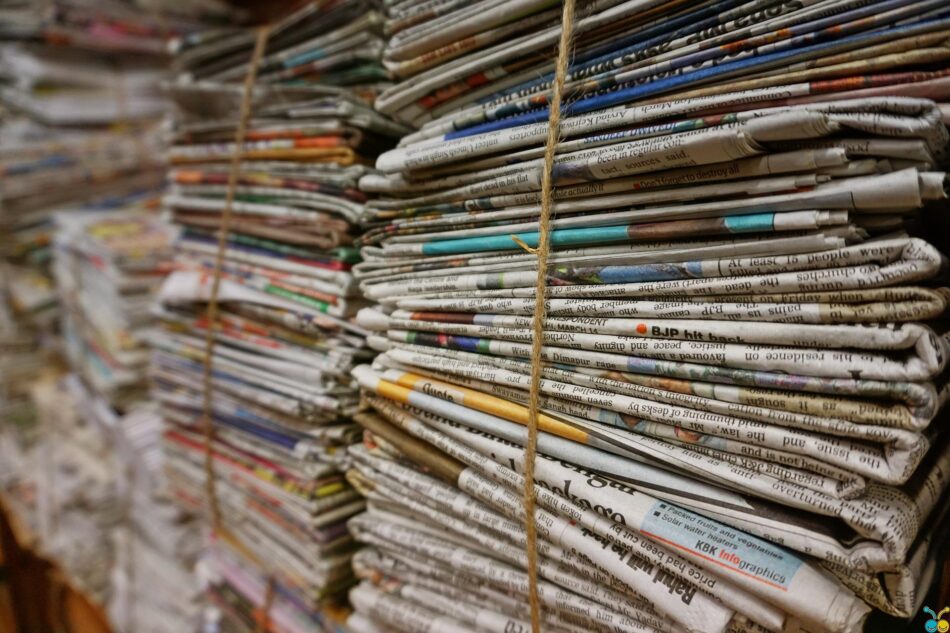Prepare Your Business for New Food Waste Legislation in the UK
From 31 March 2025, most UK businesses must arrange separate food waste collections. Learn and prepare for the new food waste legislation in the UK.

Recycling newspaper is the best way to get rid of the old broadsheets and tabloids lying around your home or business. Even though sales are declining, many people still pick up or have a daily paper delivered. There are various ways to manage old newspaper and it’s important you do so in a sustainable and environmentally friendly way.
Whether you get a daily or weekly paper delivered to your home or business, how you get rid of it has a significant impact on our environment. Find out how to recycle newspaper and dispose of it safely and responsibly in this guide.
William Caxton introduced the first English printing press in 1476. It wasn’t until the early 16th century when the first newspapers were distributed across Britain. Then in the mid-17th century the idea of newspapers really started to take off with around 30,000 newspapers and newsletters printed and distributed in this period.
Newspaper waste classes as a type of post-consumer waste. This includes any goods received and used by a consumer, which is then discarded. Due to the materials they’re made from, newspapers also class as a type of paper waste. Therefore, you should recycle newspapers alongside any other paper recycling your home or business produces.
Newspapers are made from non-archival and low-cost papers that consist mainly of wood pulp. These types of paper are most frequently used to print publications, newspapers, and advertising material. Newspapers are usually printed on newsprint – an uncoated ground-wood paper made by mechanically grinding wood pulp without removing lignin and other wood elements.
Some newspapers and their inserts come in a plastic wrapping. This is normally made from a type of plastic known as polythene, which is also recyclable when disposed of alongside plastic waste.
Recycling newspaper is the best way to get rid of old newspapers. Paper is an incredibly valuable material that’s recyclable when it’s clean and dry. To recycle newspapers, you need to remove any plastic wrapping first. Then you can simply dispose of newspapers with your household or workplace paper recycling.
At home you can throw newspapers away with your domestic recycling. For businesses it can be disposed of in bins specifically for paper recycling or dry mixed recycling. These will be taken to a relevant recycling centre for processing and recycling alongside other types of paper.
Paper and pulp are the third largest industrial polluter of water, air, and soil. Chlorine-based bleaches are often used during its production, which causes toxic materials to be released into our environment. When paper rots, it releases methane gas – approximately 25 times more hazardous and toxic than carbon dioxide.
These are only problems when old newspapers aren’t disposed of properly. Therefore, recycling newspapers is important to avoid them ending up in landfill, where they’ll add to pollution levels.
It’s essential that newspaper is clean and dry when it’s sent for recycling. The top contaminants of newspapers include:
When any of these materials contaminate your newspapers, it could be impossible to recycle them. This is because when newspapers are recycled, they’re made into new materials. It’s almost impossible to remove any contaminants. For example, if your newspapers are contaminated with blood, there’s a health risk to the public if they’re recycled to make other products.
A few interesting facts about newspapers are that:
Aside from recycling them, there are other ways to use old newspapers in an eco-friendly manner. Almost all forms of non-treated and clean paper, including newspapers, can be composted. The dry material can help balance the ratio of brown (nitrogen-rich) and green (carbon-rich) materials in the pile of papers.
Since most newspapers are printed with inks that are plant-based, you don’t have to worry about the ink contaminating your compost. If you have an organic garden or are anxious about non-organic inks seeping into your pile, we suggest you check your local newspaper’s website or send them an email asking about the type of ink they use.
Alternatively, you could try the dig a hole method in composting. This is simply when you dig a one-foot hole in your back garden, after which you slowly add your newspaper. Finally, you cover the hole with some bricks or a board until it’s full.
These are a few ideas of what to do with old newspaper rather than throwing it away:
Find out more about other rubbish streams.
Get a fast FREE quote for your newspaper waste
From 31 March 2025, most UK businesses must arrange separate food waste collections. Learn and prepare for the new food waste legislation in the UK.
The study participants included business owners and company employees, revealing unexpected findings about corporate environmental practices.